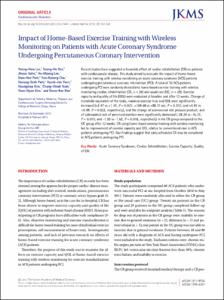KUMEL Repository
1. Journal Papers (연구논문)
1. School of Medicine (의과대학)
Dept. of Thoracic & Cardiovascular Surgery (흉부외과학)
Impact of Home-Based Exercise Training with Wireless Monitoring on Patients with Acute Coronary Syndrome Undergoing Percutaneous Coronary Intervention
- Keimyung Author(s)
- Park, Nam Hee; Hur, Seung Ho; Cho, Yun Kyeong; Park, Hyoung Seob; Yoon, Hyuck Jun; Kim, Hyung Seop; Nam, Chang Wook; Kim, Yoon Nyun; Kim, Kwon Bae
- Journal Title
- Journal of Korean Medical Science
- Issued Date
- 2013
- Volume
- 28
- Issue
- 4
- Abstract
- Recent studies have suggested a favorable effect of cardiac rehabilitation (CR) on patients
with cardiovascular disease. This study aimed to evaluate the impact of home-based
exercise training with wireless monitoring on acute coronary syndrome (ACS) patients
undergoing percutaneous coronary intervention (PCI). A total of 55 ACS patients
undergoing PCI were randomly divided into home based exercise training with wireless
monitoring cardiac rehabilitation (CR, n = 26) and usual care (UC, n = 29). Exercise
capacity and quality of life (QOL) were evaluated at baseline and after 12 weeks. Change of
metabolic equivalent of the tasks, maximal exercise time and QOL were significantly
increased (+2.47 vs +1.43, P = 0.021; +169.68 vs +88.31 sec, P = 0.012; and +4.81 vs
+0.89, P = 0.022, respectively), and the change of submaximal rate pressure product, and
of submaximal rate of perceived exertion were significantly decreased (-28.24 vs -16.21,
P = 0.013; and -1.92 vs -1.62, P = 0.018, respectively) in the CR group compared to the
UC group after 12 weeks. CR using home-based exercise training with wireless monitoring
led to improvement of exercise capacity and QOL relative to conventional care in ACS
patients undergoing PCI. Our findings suggest that early scheduled CR may be considered
in ACS patients undergoing PCI.
- Publisher
- School of Medicine
- Citation
- Young-Hwa Lee et al. (2013). Impact of Home-Based Exercise Training with Wireless Monitoring on Patients with Acute Coronary Syndrome Undergoing Percutaneous Coronary Intervention. Journal of Korean Medical Science, 28(4), 564–568. doi: 10.3346/jkms.2013.28.4.564
- Type
- Article
- ISSN
- 1011-8934
- 파일 목록
-
-
Download
 oak-aaa-2447.pdf
기타 데이터 / 622.33 kB / Adobe PDF
oak-aaa-2447.pdf
기타 데이터 / 622.33 kB / Adobe PDF
-
Items in Repository are protected by copyright, with all rights reserved, unless otherwise indicated.